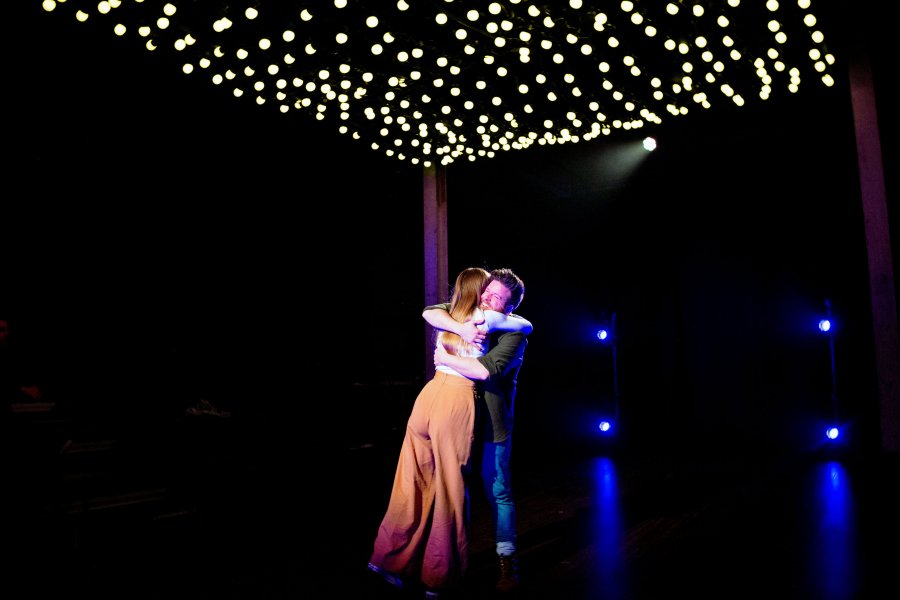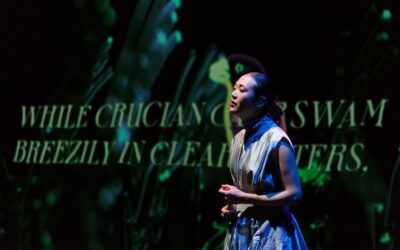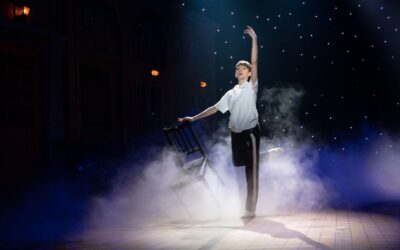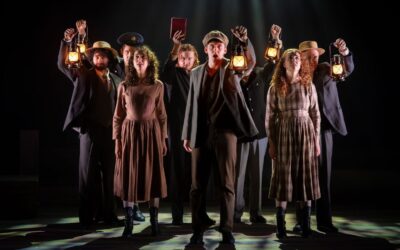By Darby Turnbull
Nick Payne’s Constellations is a story that explores multitudes, but to my eye doesn’t contain them. A high concept love story that explores a relationship between Physicist Marianne and Beekeeper Roland through the seemingly infinite possibilities that exist within the universe is an irresistible challenge for actors and designers and, based on their skills, very satisfying for an audience. Tracing Roland and Marianne through a meeting, first date, infidelity, break up, reconnection, illness and death through scenelets repeated with slight modulations that determine outcomes based on either person’s responses provides some intriguing moments, but the concept begins to get weighed down by its repetition. At its best it explores how one person can contain so much whether they know it or not; a laid back, easy going, personable man can also be, based on the circumstances, sleazy, gentle, aggressive, dismissive or upstanding. A sophisticated, highly educated, charismatic woman faced with her own mortality can have wildly diverse ways of exercising her autonomy.
Artefact theatre has assembled a highly accomplished team of artists for this production, which has resulted in a slick and often illuminating presentation of Payne’s text which has attracted big names and acclaimed performances all over the world. Mark Yeates and Bridie Pamment, under Matthew Cox’s direction, definitely earn their places alongside Rafe Spall and Sally Hawkins, Jake Gyllenhal and Ruth Wilson, as well as London’s recent rotation of pairs, Sheila Atim, Russell Tovey, Zoe Wannamaker and Peter Capaldi – to name a few to cast Roland and Marianne beyond a white heterosexual pair in their thirties.
Cox has ensured that both his actors are well supported by the space for the rigorous physical and vocal demands of the piece. Each section, no matter how brief, is deftly conveyed with humour and insight. Both actors rise to the occasion with consistently fresh, energetic interpretations of their characters in all their innovations. It’s a joy to watch two such talented individuals revel in each others skill, charisma and professionalism. Their trust and regard for each other is frequently endearing and illuminating in all their transitions. It’s not enough that they must share chemistry, they need about six different ways of showing their chemistry which they accomplish with a relish that translates easily to the audience. Payne’s text, though, means it’s difficult to become immersed in their relationship itself and comes across more as a thoughtful experiment, no matter how emotionally committed the actors are. This production, being more humane than clinical, means that it never quite transcends that barrier.
Bridie Pammet is tons of fun as Marianne, her choice to play her as resolutely of a higher social class than Roland, not just by profession but by birth, makes for some truly insightful interpretations of their interactions in ways that I hadn’t considered in previous encounters with this play. She’s at times hilariously snooty and beams with social ease and class confidence, as well as a limited perspective that comes with privilege. She’s radiant in her occasional social awkwardness and heartbreaking in her deterioration. She never attempts to soften her edges and, in fact, revels in her occasional careless cruelty and disdain, but is also fiercely protective of her space and dignity that allows the audience, like Roland, to form many different attachments to her.
Mark Yeates is a brilliantly instinctive and open performer; with each character I’ve seen him play I’ve marvelled at how reactive he is to his fellow performers and how they, and he, rise to meet each other and give their best work. Like Pammet, he never insists on making Roland ‘likeable’ but conveys a desperate need to be liked and a myriad of responses for when he’s not getting his anticipated or desired response; needy, awkward, the occasional threat of violence, but he also contains an essential charm that is malleable enough to be both noxious and heartening.
Given Cox’s decision to stage the performance in traverse with no additional staging, Tim Bosner’s lighting does superb work in seamlessly taking us through the many complex iterations of the story with a truly gorgeous blanket of light bulbs that illuminate their journey. One of the highlights being the increasing beams of light that accompany their first (successful) marriage proposal.
Constellations at 45 downstairs is an excellent opportunity to see a play that’s been touted as a modern classic being performed by, and supported by, a group of artists who are consistently showing the sheer quality of our local creative’s contribution to the cultural landscape.
Image: Ben Andrews





